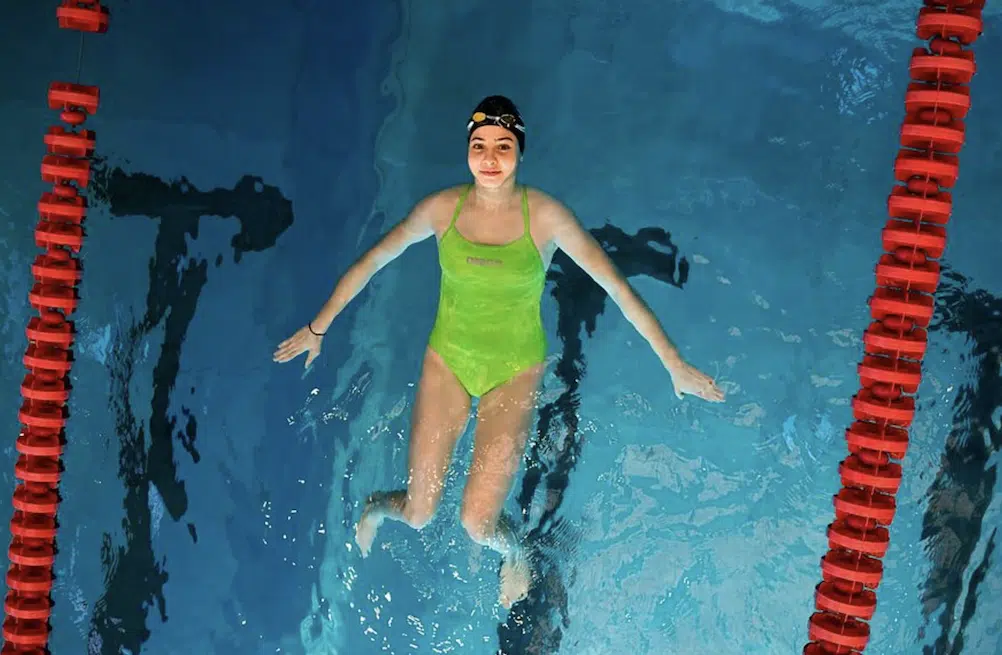Eight reasons why everyone needs to watch The Swimmers
Posted by Jenni Regan on January 12, 2023IMIX Chief Exec, Jenni Regan watches the highly-acclaimed film about the remarkable Mardini sisters and shares what it tells us about the journeys people take to live in safety. (Warning: Spoiler alert!)

Image of Yusra Mardini via Wikimedia Commons/ONU Brasil
The Swimmers is based on the incredible true story of sisters Yusra and Sara Mardini who left war-torn Syria in 2015 with the intention of seeking asylum in Germany.
Yusra and Sara were both aspiring Olympic swimmers who had to battle horrific conditions when the boat they were in to cross the Aegean Sea got into difficulties and they made the choice to jump into the water and swim alongside.
Of course, the fairy tale ending is that Yusra finally gets to The Olympics, but this film is far more than a story about sporting success, based on a true story and with input from the sisters and many others with lived experience. It is a must see for anyone who wants to understand why and how people become refugees.
1. It shows the normality of life in a war zone
There is a poignant scene where the sisters are enjoying a night out, dancing and drinking, like any other teenagers. However, alongside the pounding music and lightshow the audience suddenly realise that the view from this rooftop club in Damascus is of rockets raining down upon a city.
But life, even in a war zone carries on as normal, the teens are seen hanging out in cafés, training in the pool and attempting to hide from family parties.
2. We see the reality of what a journey to and across Europe looks like
The girls begin their journey by plane, pretending they are off on holiday. However, the rest of the journey is an exhausting mix of walking, lorries, boats and cars. They constantly face barriers and walls both literally and figuratively. As the group attempts to stay alive by constantly moving, the reality of blisters, poor hygiene and lack of food and drink is ever present.
Film maker Hassan Akkad who had himself made the journey by boat, worked as an associate director and consultant on the film and shared the footage from his journey with the director Sally El Hosaini to ensure that what we see on screen is authentic.
3. It vilifies people smugglers
People smugglers, people traffickers and those seeking asylum are often muddled or thrown together by policy makers and journalists. This story shows the uneasy, unbalanced relationship between people smugglers and those who are desperate. We see not only shady gangs but also locals clearly trying to make money. People are cheated out of their money and obligations not fulfilled. But there is simply no other choice for those on the journey.
4. It highlights the lack of family reunion routes
The pain of leaving their family is ever present throughout the film, the girls head for Germany thinking that because one of the sisters is still legally a child that they will be able to apply for their family to join them straight away. However, It turns out that even after Yusra reaches the Olympics her family are still forced to make the journey to reunite via an irregular route.
5. It explains why people don’t always stay in the first ‘safe’ country
The first destination on this journey is Turkey, which is common for so many displaced people. However, the country is already housing nearly four million Syrian asylum seekers and the family know that although the country might offer safety it would be unable to offer anything else for these girls who had already at this point shown great talent and drive. Why should they be forced to just exist when they have had no control over the reasons for leaving their home?
They also have a friend in a German city, we know that personal connections and language are both reasons people attempt to reach certain countries.
6. It shows what a lifeline phones and technology can be
The phone is a lifeline for the girls to keep in touch with their family. At times they ignore calls from their parents, knowing that the situation they are in would scare them but when they are in danger in the sea, all the refugees are desperately trying to phone for help. One of the first things they do when they reach Europe is to buy a new sim card.
7. It highlights the boredom of waiting for an asylum decision
In The Swimmers when the girls finally reach their European destination, they finally enter the asylum system. They are given a place to live, which is basically a bed in a huge hanger, divided by sheets, but then the wait begins.
It is easy to presume that when people reach safety that this is the end of the story but for most people it is just the beginning of form filling and interviews. Life is on hold until a decision is made, and whilst basic needs are met, this is not living a life.
8. The film humanises refugees
Even as an Olympian Yusra is flawed, at times she is ungrateful for the chances being offered to her. She and Sara are just like many other sisters, they fall out and make up, they annoy and criticise each other. They care about how they look, make friends and there is often the hint of romantic relationships, amongst the trauma.
“It’s very easy to be numbed by numbers,” says Sally El Hosaini the film’s director. “You hear about all these numbers all the time of people and refugees and it’s easy to forget that they’re human beings. And what cinema does so well is it allows an audience to walk around in someone else’s shoes, and to literally be on the journey with them.”
The Swimmers is available to watch on Netflix now.



